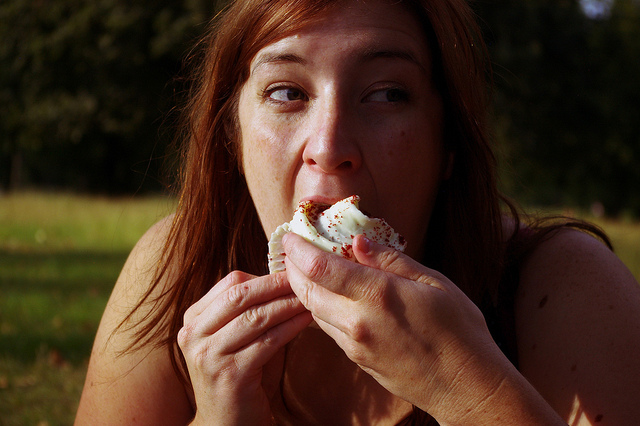I am standing in the kitchen in the trailer where I grew up.
My mother is standing at the typical 1970’s golden rod stove, a nice contrast to the dark wood paneling on the walls. She is making dinner, and I am impatiently waiting like any four-year-old would.
I ask for something to eat right now—I simply cannot wait another moment.
My father enters the room and hears me fussing. He asks my mother why I can’t have something right now.
She says that I am too fat, and need to wait for dinner. They argue back and forth for a minute. Mother peels a carrot. My father picks me up and holds me against his chest while I eat it. He speaks kind words to me, and for a brief moment I feel incredibly loved and nurtured.
This moment is indelibly burned into my mind. It is the precise moment in time when my issues with food and weight began.
It was the first time someone had used the “f word” to describe me. It certainly would not be the last time I would be called fat—by people who loved me, by complete strangers—it didn’t matter.
The word stung the same way no matter who had said it.
What I probably actually needed in that moment more than a pre-dinner snack was my father’s affection. The kind words, the feeling of security that comes from being scooped up that way and adored for a precious fleeting moment was so rare for me to experience. That moment, being held by the first man who would ever love me, I needed that.
I needed to be loved, and held, and protected.
I needed to feel safe and secure.
But, sometimes, daddy couldn’t give me what I needed. Sometimes, mother’s words were cruel. Sometimes life was scary and difficult. And, somehow I learned to companion myself with food. That feeling of being loved and nurtured and held tightly and spoken to gently—if I couldn’t find it in my relationships, I would find it in the refrigerator, the drive through window, or at the bottom of the ice cream carton.
I now understand that my emotional attachment to food in my childhood laid the groundwork for my binge eating disorder. It became a powerful force in my life, and continued on through adulthood. Though I was aware that I had become morbidly obese, and logically I knew that I was not eating well, I was unconsciously consuming anything I could put in my mouth to change my mood, entertain, console, comfort, distract, or punish myself.
It took a few months of therapy for me to put all the pieces together. I sat on my counselor’s couch and cried one day. I weighed almost 250 pounds. I was miserable. I was angry with myself, and couldn’t for the life of me understand why I could not control my eating and my weight.
My therapist listened to me list all the reasons why I thought I couldn’t lose the weight. Then, she said, “When you want to lose it, you will. You must be getting something out of what you’re doing, or you wouldn’t be doing it.”
I was so frustrated. I had no idea what she meant.
Why would I intentionally make myself so unhealthy?
After thinking about it for a few days it hit me. I had felt disconnected in my marriage for many years, and very lonely. The binges served two purposes for me. One was the distraction and comfort that came from the ritual of binging—it had become a deep addiction for me.
The other purpose was that it kept me feeling badly about my body.
I realized that if I had felt good in my skin, and if another man had given me the attention I craved so deeply, I would have cheated on my ex-husband. Staying fat meant staying faithful.
This realization broke my heart. I was literally killing myself to stay in our marriage. Though I expressed this to my ex-husband, months later it became clear that the only way for me to take control of my health again would be to end our marriage.
Learning to manage my eating disorder has been a long process, but a necessary one. In the beginning, I really thought that what I ate was the most important thing.
And, truly, that is part of it.
I had to identify my trigger foods and actively avoid them.
I also needed to get more physically active—which can also go too far for me and become an unhealthy behavior. Moderation on all of that is very important. To eat and exercise moderately, I have to be mindful of everything I’m putting in my body, and every minute I’m spending in the gym.
Even more important than what I’m eating, however, is why I’m eating. Again, this is an exercise in mindfulness. When I crave certain foods or want to eat outside of normal mealtimes, I have to check in with myself and ask, “why do I want to eat right now?”
If I’m physically hungry and reaching for something nutritious, it is never a problem. I give myself permission to eat all the healthy food I want when I am eating to fuel my body, since that’s what food is for.
But, if I’m reaching for junk, or craving one of my trigger foods—I have to get really honest with myself and figure out why. Usually I am tired, stressed, bored, or eating for the purpose of changing my mood rather than fueling my body. I know that this is my pattern, and now that I am aware of it I can make a different choice. Instead of binging or mindlessly eating emotionally I find a different way to distract myself until that desire passes.
It has been a long road for me, but I have been able to make some really healthy changes in my life. Today I am over seventy pounds lighter than my heaviest weight. I dance and practice yoga most days every week. I eat for nutrition now, rather than emotional comfort.
It feels really good to be in control again—I’m no longer a slave to my addiction.
I think my counselor’s question really applies to anything in our lives when we feel stuck. What are we getting out of continuing the behaviors that don’t support our greatest good? When we can answer that question honestly, we have the power to change our lives.
Our magic begins when we choose to change and start moving in the direction of what we desire.
With a little mindful dedication, there is nothing we cannot do.
Author: Renée Dubeau
Editor: Renée Picard
Photo: Amelia Wells/Flickr


 Share on bsky
Share on bsky





Read 1 comment and reply